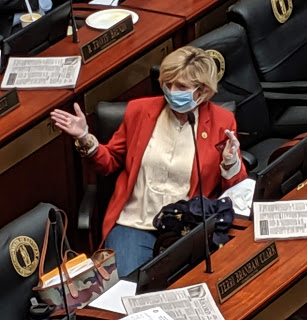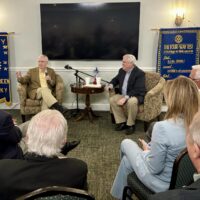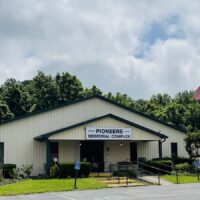FRANKFORT, Ky. — A bill supporting and enhancing Gov. Andy Beshear’s executive orders to address the coronavirus pandemic passed without dissent in both chambers of the legislature Thursday, with a caution that more measures will likely be needed.

“Things evolve as we know day to day on this issue, and I’m sure there will be more needs,” Sen. Ralph Alvarado, R-Winchester, said in describing the bill. Senate President Robert Stivers told Kentucky Health News that this is likely the first step of many to address this issue, and Senate Democratic Leader Morgan McGarvey of Louisville, said, “This a good bill and it’s a good start.”
Senate Bill 150, generally called the “Covid-19 relief bill,” was gutted of its original language about surprise medical billing and amended to offer relief on several fronts for COVID-19 response.
The bill has several health-care provisions, including one to make it easier for providers to serve patients through telehealth, including one to allow out-of-state providers to practice telehealth in Kentucky.
It also clarifies language on what is considered emergent or urgent care, stating that a health-care procedure can be performed it it meets this criteria. It also allows services like physical therapy, occupational therapy, or alcohol- and drug-abuse treatment to be administered if they are ordered by a physician licensed in Kentucky.
Those provisions are in response to Beshear’s order for medical facilities and providers to cease all elective procedures as a way to keep hospital beds available and preserve personal protective equipment.
The bill also has provisions aimed at expanding the state’s health-care workforce.
For example, it allows the stateBoard of Medical Licensure, the Board of Emergency Medical Services and the Board of Nursingto waive or modify licensure or certification requirements for health-care providers who are licensed or certified in other states to provide those services in Kentucky.
It also relaxes the scope of practice requirements to allow health-care providers to practice in all settings of care; allows physicians to supervise a larger number of other providers and to do it by telephone; allows rapid certification, licensing, re-certification or re-licensing of providers; allows medical students to care for patients under a provider’s supervision; and allows reactivation of licenses for inactive and retired health-care providers so that they may render service.
The bill also provides immunity for health-care providers who render care in good faith to COVID-19 patients during the state of emergency, as well as immunity for Kentucky businesses acting in good faith to make or provide personal protective equipment or personal-hygiene supplies related to COVID-19, and that don’t make or provide such products.
A time of crisis
The bill passed on a day that Kentucky reported 50 new cases of COVID-19, its largest one-day increase so far, for a total of 248. It also came at a time that Beshear warns the public daily that the next few weeks are expected to get worse.
“The next two to possibly three weeks is gonna be absolutely critical in our battle against the coronavirus,” Beshear said at his daily press conference March 25, repeating the point several times.
The bill also has provisions to help those who have lost their jobs or have had their hours decreased because of COVID-19. It waives the seven-day waiting period for unemployment benefits, extends benefits to those who are self-employed, and allows those who were not let go, but simply had their hours cut back, to also apply.
“The number of workers who filed for unemployment jumped to 48,847 from 2,785 the week before, according to non-seasonally adjusted figures from the Labor Department,” Alfred Miller reported March 26 for the Louisville Courier Journal.
Among other provisions, the bill also extends the state deadline for filing income taxes to be the same as the new federal deadline, July 15, and removes all penalties and interest that could result from such extensions; permits restaurants with a license to sell alcoholic beverages in conjunction with takeout food orders; authorizes funds to support the state’s COVID-19 hotline; and extends the length of time government entities have to respond to an open-records request to 10 days, from three.
The bill also:
- Allows the governor to direct the suspension or waiving of the collection of licensing fees, renewal fees, application fees, and other administrative requirements where they are required by the state. Licensees may continue working without interruptions, and shall be granted at least 30 days after the expiration of the state of emergency to pay any fees or complete any administrative obligation before any action is taken.
- Allows a public agency to delay on-site inspections during the emergency. Public agencies may conduct their meetings by live audio or live video teleconference, with information on how the public and media can access the meeting.
- Suspends deadlines related to land use, planning and zoning, and deadlines for code enforcement proceedings and hearings.
- Allows taxing districts to suspend or otherwise extend applicable deadlines.
- Suspends the rule that a notary certify a signature after face to contact, if they can communicate via a video teleconference in real time.
- Requires Beshear to declare when the state of emergency has ceased, and if he has not done so by the first day of the next regular legislative session, the General Assembly may make that determination.
The report from the House-Senate conference committee that wrote the bill points out that its actions “are not statements of approval or disapproval relative to any executive order or action,” but are necessary to support Beshear’s actions during the state of emergency because the General Assembly is responsible for creating or modifying law and for creating policy.
Asked as the bill was nearing passage what he needed from it, Beshear said, “I need maximum flexibility. We are living this battle and we are fighting it day by day. I need the maximum amount of financial flexibility. I need the maximum amount of flexibility if we have to take more restrictive steps. We need the flexibility to be able to move very fast to work with local governments … and local law enforcement when needed.”
The bill has an emergency clause, which means it will become law as soon as Beshear signs it.
Melissa Patrick is a reporter for Kentucky Health News, an independent news service of the Institute for Rural Journalism and Community Issues, based in the School of Journalism and Media at the University of Kentucky, with support from the Foundation for a Healthy Kentucky. She has received several competitive fellowships, including the 2016-17 Nursing and Health Care Workforce Media Fellow of the Center for Health, Media & Policy, which allowed her to focus on and write about nursing workforce issues in Kentucky; and the year-long Association of Health Care Journalists 2017-18 Regional Health Journalism Program fellowship. She is a former registered nurse and holds degrees in journalism and community leadership and development from UK.






